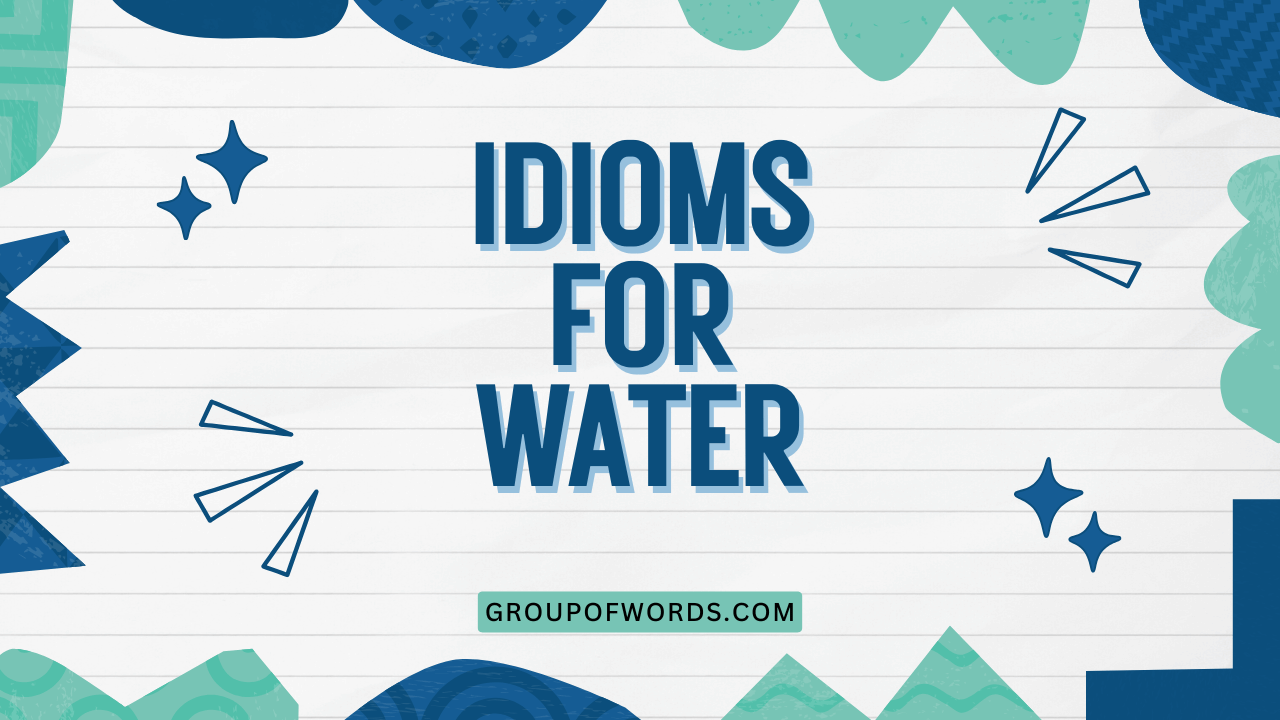Diving Deep: Mastering Idioms Related to Water
English is full of colorful expressions, and idioms are among the most vibrant. Idioms related to water are particularly rich, offering a glimpse into how we use metaphors to describe various situations, emotions, and behaviors.
Understanding these idioms not only enhances your comprehension of English but also allows you to express yourself more creatively and effectively. This article is designed for English language learners of all levels, from beginners to advanced speakers, and anyone interested in expanding their idiomatic vocabulary.
By the end of this guide, you’ll be able to confidently use and understand a wide range of water-related idioms.
Table of Contents
- Introduction
- What are Idioms?
- Structural Breakdown of Idioms
- Types of Water Idioms
- Examples of Water Idioms
- Usage Rules for Water Idioms
- Common Mistakes with Water Idioms
- Practice Exercises
- Advanced Topics in Water Idioms
- Frequently Asked Questions
- Conclusion
What are Idioms?
An idiom is a phrase or expression whose meaning cannot be understood from the literal meanings of the individual words. Instead, the idiom has a figurative meaning that is unique to the language and culture in which it is used.
Idioms add color, depth, and nuance to communication, making it more engaging and expressive. They often reflect cultural values, historical events, or common experiences.
Idioms can be classified based on their grammatical structure or the types of meanings they convey. Some idioms are verb phrases (e.g., kick the bucket), while others are noun phrases (e.g., a piece of cake). They also vary in formality, ranging from colloquial expressions to more formal literary devices.
In the context of water idioms, the core concept of water is used metaphorically to represent various aspects of life, such as emotions, situations, and relationships. Water can symbolize calmness, turbulence, clarity, or obscurity, depending on the specific idiom.
Structural Breakdown of Idioms
Understanding the structure of idioms can help you recognize and use them more effectively. Most idioms consist of a combination of words that, when taken literally, do not make sense in the given context.
The key is to recognize that the entire phrase functions as a single unit of meaning.
Idioms often involve metaphors, which are figures of speech that compare two unrelated things based on a shared characteristic. For example, the idiom “in deep water” uses the metaphor of being submerged in water to represent being in a difficult or dangerous situation.
Some idioms also contain similes, which are comparisons that use words like “like” or “as.” While less common in water idioms, similes can still play a role in related expressions. For instance, “as clear as water” is a simile that emphasizes the clarity of something.
It’s important to note that the structure of an idiom is usually fixed. You cannot arbitrarily change the words or their order without altering the meaning or making the expression nonsensical.
For example, “in deep water” cannot be changed to “in profound water” without losing its idiomatic meaning.
Types of Water Idioms
Water idioms can be categorized based on the themes or concepts they represent. Here are some common categories:
- Difficulty and Trouble: These idioms use water to symbolize challenging or problematic situations (e.g., in deep water).
- Ease and Smoothness: These idioms use water to represent effortless progress or pleasant circumstances (e.g., smooth sailing).
- Change and Influence: These idioms use water to describe the act of causing an impact or undergoing transformation (e.g., make waves).
- Adaptability and Flexibility: These idioms use water to portray the ability to adjust to changing circumstances (e.g., go with the flow).
- Caution and Hesitation: These idioms use water to signify the act of proceeding carefully or tentatively (e.g., test the waters).
Each category provides a unique perspective on how water metaphors are used to express different aspects of human experience. By understanding these categories, you can better appreciate the richness and versatility of water idioms.
Examples of Water Idioms
This section provides a comprehensive list of water idioms, organized by category, with examples illustrating their usage in context.
Troubled Waters
These idioms describe difficult, dangerous, or problematic situations.
The following table provides examples of idioms related to troubled waters, with their meanings and example sentences:
| Idiom | Meaning | Example Sentence |
|---|---|---|
| In deep water | In a difficult or dangerous situation | He’s in deep water with the tax authorities. |
| Over one’s head | Beyond one’s ability to understand or cope with | The technical jargon was completely over my head. |
| Sink or swim | To succeed or fail entirely on one’s own efforts | The company’s new employees are left to sink or swim. |
| A drop in the ocean | A very small amount compared to what is needed | Our contribution is just a drop in the ocean compared to the total cost. |
| Muddy the waters | To make a situation more complicated or confusing | His conflicting statements only muddied the waters further. |
| Troubled waters | A difficult or unstable situation | The company is navigating troubled waters due to the economic downturn. |
| Be all at sea | To be confused or uncertain | I’m all at sea with these new regulations. |
| Drowning in debt | Being overwhelmed by debt | The family was drowning in debt after the medical bills piled up. |
| Run into stormy weather | Encounter difficulties or problems | The project ran into stormy weather when funding was cut. |
| Up the creek without a paddle | In a difficult situation without the means to get out of it | If we miss the deadline, we’ll be up the creek without a paddle. |
| Between Scylla and Charybdis | Between two dangers where avoiding one means getting closer to the other | The negotiator felt he was between Scylla and Charybdis, damned if he did and damned if he didn’t. |
| In hot water | In trouble | He found himself in hot water after criticizing his boss. |
| Like a fish out of water | Feeling uncomfortable or out of place | She felt like a fish out of water at the formal dinner. |
| Water under the bridge | Something that happened in the past and is no longer important | “The argument is water under the bridge,” he said. |
| Dead in the water | Not progressing; failed or stalled | The project is dead in the water due to lack of funding. |
| Pour oil on troubled waters | To try to calm a disagreement or difficult situation | She tried to pour oil on troubled waters during the argument. |
| Stir up a hornet’s nest | To cause trouble or provoke a strong negative reaction | His comments stirred up a hornet’s nest among the shareholders. |
| Swept away | Overwhelmed by emotions or circumstances | She was swept away by the romantic atmosphere. |
| Taken by storm | To be overwhelmed or greatly affected by something sudden and powerful. | The band took the music world by storm with their debut album. |
| Run aground | To encounter problems or difficulties that stop progress | The negotiations ran aground due to disagreements over the terms. |
Smooth Sailing
These idioms describe situations that are easy, without problems, or progressing well.
The following table illustrates idioms related to smooth sailing, complete with meanings and example sentences:
| Idiom | Meaning | Example Sentence |
|---|---|---|
| Smooth sailing | Easy progress without problems | After the initial challenges, it was smooth sailing for the rest of the project. |
| Plain sailing | Easy and straightforward | Once we understood the instructions, it was plain sailing. |
| Go swimmingly | To proceed very well without any problems | The event went swimmingly, and everyone had a great time. |
| On an even keel | Stable and balanced, without sudden changes | The company is now on an even keel after the restructuring. |
| Float someone’s boat | To make someone happy or satisfied | That movie really floated my boat. |
| Everything’s shipshape | Everything is neat, tidy, and in order | After the cleanup, the house was shipshape again. |
| Clear as a bell | Very clear and easy to understand | The instructions were clear as a bell. |
| Go with the tide | To agree with what everyone else is doing | He decided to go with the tide and support the proposal. |
| Make good headway | To make good progress | They were making good headway with the construction. |
| Keep afloat | To manage to survive financially | The business struggled to keep afloat during the recession. |
| Like water off a duck’s back | Having no effect on someone | Criticism rolled off him like water off a duck’s back. |
| Drift along | To live without any clear purpose or direction | He drifted along after graduating, unsure of what to do. |
| Have a good run | To experience a period of success | The team had a good run in the playoffs. |
| All plain sailing from now on | Easy and straightforward from this point forward | With the permit approved, it should be all plain sailing from now on. |
| Stay above water | To manage to survive or cope with difficulties, especially financially | We’re just trying to stay above water during these tough times. |
| Keep one’s head above water | To manage to deal with a difficult situation | She was struggling to keep her head above water with all the work. |
| On stream | Operating or progressing according to plan | The new factory is now fully on stream. |
| In full flood | At the peak of activity or intensity | The river was in full flood after the heavy rains. |
| High and dry | In a helpless or abandoned situation | They left him high and dry when the business failed. |
| Water seeks its own level | People of similar backgrounds or interests will naturally associate with each other | It’s no surprise they became friends; water seeks its own level. |
Making Waves
These idioms refer to causing a disturbance, controversy, or significant impact.
The following table showcases idioms related to making waves, along with their meanings and example sentences:
| Idiom | Meaning | Example Sentence |
|---|---|---|
| Make waves | To cause a disturbance or create a stir | The new policy is likely to make waves among the employees. |
| Rock the boat | To disrupt a stable situation or cause trouble | He didn’t want to rock the boat by questioning the manager’s decision. |
| Stem the tide | To prevent something from increasing or continuing | The government is trying to stem the tide of illegal immigration. |
| Turn the tide | To reverse a trend or change the course of events | The new strategy helped to turn the tide in the company’s fortunes. |
| All at sea | Confused or uncertain | I’m all at sea with these new instructions. |
| Make a splash | To attract a lot of attention or become successful quickly | The new artist made a splash at the gallery opening. |
| Wash away | To remove or destroy completely | The flood washed away the bridge. |
| In the wake of | Following or as a result of | In the wake of the storm, many homes were destroyed. |
| Churn the water | To agitate or create a commotion | The scandal churned the water in the political arena. |
| Run deep | To be strongly felt or deeply rooted | The feelings of resentment run deep in the community. |
| Set sail | To begin a journey or venture | The company is ready to set sail on its new business plan. |
| Ride the crest of a wave | To be at the peak of success or popularity | The athlete is riding the crest of a wave after winning the championship. |
| Against the tide | Acting against the prevailing opinion or trend | She went against the tide and voted against the proposal. |
| A sea change | A significant or dramatic transformation | The internet has brought about a sea change in the way we communicate. |
| Go overboard | To do something excessively | He went overboard with the decorations for the party. |
| Swamped with work | Overwhelmed with a large amount of work | I’m swamped with work this week. |
| A flash flood | Something that happens suddenly and intensely | The news of the scandal was like a flash flood, surprising everyone. |
| Inundate | To overwhelm someone with things or people to be dealt with | The office was inundated with requests after the announcement. |
| Washed up | No longer successful or effective | The former star felt washed up after his career declined. |
| Adrift | Lacking direction or purpose | After losing his job, he felt adrift. |
Going With the Flow
These idioms represent adapting to circumstances, being flexible, and not resisting change.
The following table provides examples of idioms related to going with the flow, along with their meanings and example sentences:
| Idiom | Meaning | Example Sentence |
|---|---|---|
| Go with the flow | To adapt to circumstances and not resist change | It’s easier to go with the flow than to fight against it. |
| Swim with the tide | To conform to the prevailing opinion or behavior | He decided to swim with the tide and support the popular candidate. |
| Keep your head above water | To manage to deal with a difficult situation | She’s working hard to keep her head above water. |
| Weather the storm | To survive a difficult period | The company managed to weather the storm and emerge stronger. |
| Ride out the storm | To endure a difficult situation until it passes | We just need to ride out the storm and things will get better. |
| Let nature take its course | To allow something to develop naturally without interference | We decided to let nature take its course with the healing process. |
| A sea of faces | A large crowd of people | He looked out at a sea of faces in the audience. |
| Drift along | To live without any clear purpose or direction | He drifted along after graduating, unsure of what to do. |
| At sea | Confused or uncertain | I’m completely at sea with these new regulations. |
| Float an idea | To suggest an idea for consideration | She decided to float an idea at the meeting. |
| Eddy | A circular movement of water, often against the main current; a similar movement of air, snow, or dust. | The leaves swirled in an eddy near the riverbank. |
| Navigate | To find one’s way, especially by using instruments or maps; to deal with something difficult. | She had to navigate the complex politics of the company. |
| Submerge | To go or cause to go below the surface of water; to cover or hide completely. | The town was submerged by the floodwaters. |
| Ebb and flow | To move back and forth in a regular rhythm; to increase and decrease. | The popularity of the trend ebbed and flowed over the years. |
| Current | A body of water or air moving in a definite direction; a general tendency or course of events. | The strong current made swimming difficult. |
| Tidal wave | An exceptionally large ocean wave, especially one caused by an underwater earthquake or volcanic eruption. | The small town was destroyed by the unexpected tidal wave. |
| Wade | To walk through water or other liquid or soft material. | They had to wade through the shallow stream. |
| Channel | A length of water wider than a strait, joining two larger areas of water; a band of frequencies used in radio and television transmission; to direct something into a particular course. | The river flowed through a narrow channel. |
| In the pipeline | Being planned or developed but not yet available or fully operational. | There are several new projects in the pipeline. |
| Reach a watershed | To reach a point that marks a division or a change of course; a critical point. | The agreement marked a watershed in the negotiations. |
Testing the Waters
These idioms indicate proceeding cautiously, exploring possibilities, or assessing a situation before committing.
The following table provides examples of idioms related to testing the waters, along with their meanings and example sentences:
| Idiom | Meaning | Example Sentence |
|---|---|---|
| Test the waters | To explore possibilities or assess a situation before committing | He decided to test the waters before launching the new product. |
| Dip a toe in the water | To start something cautiously or tentatively | She wanted to dip a toe in the water before investing a lot of money. |
| See how the wind blows | To observe the current situation or trends before making a decision | We’ll see how the wind blows before we decide on our next move. |
| Sound out | To ask someone questions to find out their opinion about something | I’m going to sound out my colleagues before making a final decision. |
| Take the temperature | To assess the general mood or opinion about something | We need to take the temperature of the market before we proceed. |
| Probe | To investigate or examine something thoroughly | The investigators are probing into the cause of the accident. |
| Fish for compliments | To try to get people to say nice things about you | She was obviously fishing for compliments with her new dress. |
| A sea of troubles | A great number of problems or difficulties | He faced a sea of troubles after losing his job. |
| Riding high | To be successful or popular | The team is riding high after their recent victories. |
| Under the surface | Not immediately apparent or obvious | There were tensions under the surface of their apparent friendship. |
| Navigate | To find one’s way, especially by using instruments or maps; to deal with something difficult. | She had to navigate the complex politics of the company. |
| Make a big splash | To be very successful or noticeable | The new product is expected to make a big splash in the market. |
| Chart a course | To plan a course of action; to set a direction | The company needs to chart a course for the future. |
| Dam the flow | To obstruct or stop the progress of something | The protesters tried to dam the flow of traffic. |
| In the offing | Likely to happen or appear soon | There are changes in the offing. |
| Sound the depths | To thoroughly investigate or explore something | The researchers tried to sound the depths of the mystery. |
| Run deep | To be strongly felt or deeply rooted | The feelings of resentment run deep in the community. |
| Clear the air | To resolve a misunderstanding or tension | They needed to clear the air after the argument. |
| Get one’s feet wet | To begin doing something new or unfamiliar | She decided to get her feet wet in the stock market. |
| Take soundings | To measure or investigate something carefully before making a decision | They need to take soundings before investing in the new venture. |
Usage Rules for Water Idioms
Using water idioms correctly requires attention to context and nuance. Here are some general rules to follow:
- Understand the meaning: Before using an idiom, make sure you fully understand its figurative meaning and connotations.
- Consider the context: Choose idioms that are appropriate for the situation and audience. Some idioms are more formal than others.
- Use them sparingly: While idioms can add color to your language, overusing them can make your speech sound unnatural or contrived.
- Avoid mixing idioms: Combining parts of different idioms can create nonsensical expressions.
- Be aware of cultural differences: Some idioms may not translate well across cultures, so be mindful of your audience.
By following these rules, you can use water idioms effectively and confidently in your communication.
Common Mistakes with Water Idioms
Learners often make mistakes when using idioms due to their non-literal nature. Here are some common errors to avoid:
| Incorrect | Correct | Explanation |
|---|---|---|
| He is in profound water. | He is in deep water. | “Deep water” is the correct idiom, not “profound water.” |
| She rocked the ship. | She rocked the boat. | The correct idiom is “rock the boat,” not “rock the ship.” |
| I’ll go with the river. | I’ll go with the flow. | “Go with the flow” is the correct idiom, not “go with the river.” |
| He dipped his feet in the water. | He dipped a toe in the water. | The idiom is “dip a toe in the water,” referring to cautious entry. |
| They are stemming the wave. | They are stemming the tide. | The correct idiom is “stem the tide,” referring to preventing an increase. |
| I’m drowning with work. | I’m swamped with work. | “Swamped” is the appropriate idiom to describe being overwhelmed. |
| Let the tide take its course. | Let nature take its course. | “Let nature take its course” is the appropriate idiom to allow natural development. |
| He’s all on the sea. | He’s all at sea. | The correct idiom is “all at sea,” meaning confused or uncertain. |
| The problem is running profoundly. | The problem is running deep. | The correct idiom is “running deep,” meaning deeply rooted. |
| She made a big pool. | She made a big splash. | The correct idiom is “make a big splash,” meaning to be very successful or noticeable. |
By being aware of these common mistakes, you can avoid errors and use water idioms more accurately.
Practice Exercises
Test your understanding of water idioms with these exercises. Choose the correct idiom to complete each sentence.
Exercise 1: Fill in the Blanks
Choose the correct idiom from the list below to complete each sentence. (in deep water, smooth sailing, make waves, go with the flow, test the waters)
| Question | Answer |
|---|---|
| 1. After the initial setbacks, it was _________ for the rest of the project. | smooth sailing |
| 2. He’s _________ with the new regulations. | in deep water |
| 3. The new policy is likely to _________ among the employees. | make waves |
| 4. It’s easier to _________ than to fight against it. | go with the flow |
| 5. She decided to _________ before investing a lot of money. | test the waters |
| 6. The company is _________ due to the economic downturn. | in deep water |
| 7. He didn’t want to _________ by questioning the manager’s decision. | make waves |
| 8. We’ll _________ before we decide on our next move. | test the waters |
| 9. After a rocky start, the project became _________. | smooth sailing |
| 10. When in doubt, it’s best to _________. | go with the flow |
Exercise 2: Multiple Choice
Choose the best idiom to complete the sentence.
| Question | Answer |
|---|---|
| 1. If we miss the deadline, we’ll be _________. a) in hot water b) up the creek without a paddle c) on an even keel |
b) up the creek without a paddle |
| 2. The event _________, and everyone had a great time. a) went swimmingly b) made a splash c) rocked the boat |
a) went swimmingly |
| 3. His comments _________ among the shareholders. a) stirred up a hornet’s nest b) poured oil on troubled waters c) tested the waters |
a) stirred up a hornet’s nest |
| 4. She felt _________ at the formal dinner. a) like a fish out of water b) in deep water c) on an even keel |
a) like a fish out of water |
| 5. The company is trying to _________ of illegal immigration. a) ride the wave b) stem the tide c) go with the flow |
b) stem the tide |
| 6. He decided to _________ and support the proposal. a) test the waters b) go overboard c) go with the tide |
c) go with the tide |
| 7. The new artist _________ at the gallery opening. a) went swimmingly b) made a splash c) tested the waters |
b) made a splash |
| 8. They left him _________ when the business failed. a) high and dry b) in deep water c) on an even keel |
a) high and dry |
| 9. She was _________ by the romantic atmosphere. a) up the creek b) swept away c) all at sea |
b) swept away |
| 10. We’re just trying to _________ during these tough times. a) stay above water b) make waves c) stem the tide |
a) stay above water |
Advanced Topics in Water Idioms
For advanced learners, it’s beneficial to explore the etymology and cultural context of water idioms. Understanding the historical origins of these expressions can provide deeper insights into their meanings and usage.
Additionally, exploring how water metaphors are used in literature and poetry can enhance your appreciation of their artistic and
symbolic power. Analyzing how authors and poets employ water imagery to convey emotions, themes, and ideas can significantly enrich your understanding of both the language and the art form.
Consider researching the origins of idioms like “between Scylla and Charybdis,” which comes from Greek mythology, or “water under the bridge,” which reflects the transient nature of water and its impact on memory. These explorations can reveal fascinating aspects of linguistic and cultural history.
Frequently Asked Questions
Why are idioms important in English?
Idioms are crucial for understanding and communicating effectively in English. They add color, depth, and nuance to the language, making it more engaging and expressive.
Native speakers frequently use idioms, so familiarity with them is essential for comprehension.
How can I learn water idioms more effectively?
To learn water idioms effectively, focus on understanding their meanings in context. Use flashcards, practice exercises, and real-life conversations to reinforce your knowledge.
Pay attention to how native speakers use idioms in various situations.
Are water idioms universal across different English-speaking countries?
While many water idioms are widely understood, some may have regional variations or be more common in certain English-speaking countries. Be aware of these differences and adapt your usage accordingly.
What should I do if I don’t understand a water idiom?
If you encounter a water idiom you don’t understand, ask for clarification. Look up the idiom in a dictionary or online resource to find its meaning and usage examples.
Context clues can also help you infer the meaning.
Can I create my own water idioms?
While it’s generally not advisable to create your own idioms, you can play with existing ones to create new expressions that are contextually relevant. However, be mindful that your creations may not be widely understood.
How do I avoid misusing water idioms?
To avoid misusing water idioms, make sure you fully understand their meanings and connotations. Practice using them in context and get feedback from native speakers.
Pay attention to the correct word order and structure of each idiom.
Are there any resources that can help me learn more about water idioms?
Yes, there are many resources available to help you learn more about water idioms. Dictionaries, online language learning platforms, and idiom-specific websites can provide valuable information and practice exercises.
Conclusion
Mastering water idioms can significantly enhance your English language skills and cultural understanding. By learning the meanings, usage rules, and common mistakes associated with these expressions, you can communicate more effectively and confidently.
Continue to explore and practice using water idioms in various contexts to deepen your knowledge and appreciation of the English language. Embrace the colorful world of idioms and let your language skills flow!






